|
On 15 October 2014, Turkish Policy Quarterly (TPQ) hosted a lively panel, titled “A Critical Juncture for the Southern Corridor: Will all Pipelines Lead to Turkey?” The event was sponsored by BP Turkey, held in academic partnership with the Caspian Center for Energy and Environment of ADA University, and supported by the Trans Adriatic Pipeline (TAP).

The panel featured:
Moderator:
- Barçın Yinanç, Op-ed Editor for Hürriyet Daily News (HDN)
Speakers:
- Matthew J. Bryza, Member of the Board of Directors of Turcas Petrol and Director of the International Centre for Defence and Security in Tallinn.
- Michael Hoffmann, External Affairs Director of Trans Adriatic Pipeline
- Murat LeCompte, Director of Communications at BP Turkey.
- John M. Roberts, Energy Security Specialist and Senior Partner at Methinks Ltd.
- Elnur Soltanov, Assistant professor at ADA University and Chair of the Caspian Center for Energy and Environment as speakers.
- Discussant: George Stavri, Visiting researcher at Dundee University’s Centre for Energy, Petroleum and Mineral Law and the Representative of the new Citizens’ Movement “one Cyprus!”

Matthew Bryza began by explaining that the US became involved in what became known as the Southern Gas Corridor under the Clinton administration in the 1990s. The incentive to become involved was predicated on the realization that in order “to have a manageable relationship with Russia, you had to make clear to Russia that there are limits to expansionism, whether it is in oil and gas, or physically on the ground as we see happening in Ukraine.” This strategic vision was geared at ensuring that the huge hydrocarbon discoveries in the Caspian Sea made their way to European marketplaces free from Russia and Iran’s monopolistic pressure, and also free from geographic chokepoints like the Turkish straits or the strait of Hormuz. Bryza explained that this strategic vision sustained itself throughout the Bush administration.
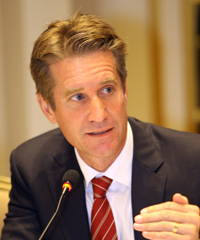 Underlining the significance of the Southern Gas Corridor for the EU, Bryza argued that it sends a “very clear signal to Moscow that Europe is going to take care of its own strategic interests on energy whether or not Russia likes it.” This was not always the case, however. He reminded the audience that back in 2004-05, the biggest European allies were reluctant to “stand up against Russian bullying in the region” because of their dependence on Russian natural gas imports. Eventually, though, the realization has spread across Europe that even if it “creates tensions with Moscow” in the short run, it is necessary that the EU support the Southern Gas Corridor initiative. Underlining the significance of the Southern Gas Corridor for the EU, Bryza argued that it sends a “very clear signal to Moscow that Europe is going to take care of its own strategic interests on energy whether or not Russia likes it.” This was not always the case, however. He reminded the audience that back in 2004-05, the biggest European allies were reluctant to “stand up against Russian bullying in the region” because of their dependence on Russian natural gas imports. Eventually, though, the realization has spread across Europe that even if it “creates tensions with Moscow” in the short run, it is necessary that the EU support the Southern Gas Corridor initiative.
In his presentation, Ambassador Bryza also focused on the successful maneuvering of Azerbaijan, explaining that Baku’s decision in 1994 to open its oil and gas sector to international companies was key. He went on to state that Azerbaijan views its natural gas exports as important for reasons beyond just making money; namely to “ensure its existence and independence by physically tying Azerbaijan to Turkey, to NATO, and now to the EU and its markets.”
Regarding the Turkmen natural gas joining the Corridor, Bryza explained that “as the Southern Gas Corridor materializes, a trans-Caspian gas pipeline from Turkmenistan is now increasingly likely.”
Bryza ended his remarks by touching on the prospects of Northern Iraqi gas joining the Southern Corridor. According to him, “energy exports from Northern Iraq into Turkey not only matter commercially for Turkish companies, but are also important strategically as a way for Turkey to bring the Iraqi Kurds under its wing and thereby facilitate the reconciliation process” that is a priority for President Erdoğan.
Addressing the difficult position Turkey finds itself in now, Bryza noted that there are numerous reasons why Turkey would not want to act in Northern Iraq; one of them being that the Iraqi government has said no to foreign troops on its soil. Bryza raised several questions to this end: If things continue as they are, will the policy of normalization between Ankara and Turkey’s Kurdish population collapse? Will that be the end of oil and gas exports? Or will Turkey act, as it has a chance to now with its allies, and prevent a genocide in Kobani, which may require suspending the efforts to oust Assad?”
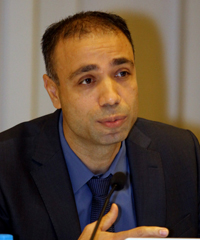 Elnur Soltanov expounded on the progression of Azerbaijan’s foreign policy over the last decade. He pointed out that in the 1990s, diplomacy was largely subject to energy policy, in the sense that Azerbaijan put all other aspects of foreign policy on hold so that it could focus on energy development. He presented the conflict over Nagorno-Karabakh as the “first and most significant” example in this regard. Soltanov explained, “It was impossible to try to protect Azerbaijan’s territorial integrity while investing in its energy policy.” Arguing against the view that energy policy was used for political survival by the regime, he said it was precisely because of the energy policy that Baku chose (sending hydrocarbons to Europe), that assassination attempts were made against Azerbaijan’s leaders in the 1990s. Elnur Soltanov expounded on the progression of Azerbaijan’s foreign policy over the last decade. He pointed out that in the 1990s, diplomacy was largely subject to energy policy, in the sense that Azerbaijan put all other aspects of foreign policy on hold so that it could focus on energy development. He presented the conflict over Nagorno-Karabakh as the “first and most significant” example in this regard. Soltanov explained, “It was impossible to try to protect Azerbaijan’s territorial integrity while investing in its energy policy.” Arguing against the view that energy policy was used for political survival by the regime, he said it was precisely because of the energy policy that Baku chose (sending hydrocarbons to Europe), that assassination attempts were made against Azerbaijan’s leaders in the 1990s.
According to Soltanov, in the 2000s, the situation reversed: energy investments were helping Azerbaijan maintain its sovereignty.
Today, diplomacy in Azerbaijan has entered a third phase, in which its energy policy and its larger foreign policy goals are intertwined. Azerbaijan has focused its efforts on “capturing more value in the chain of gas and oil that is going downstream so that it can make more money,” but also on “maintaining what it already has accomplished.”
While the US took the lead with the BTC pipeline and the EU tried to lead with Nabucco West, Soltanov stated that currently, Azerbaijan and Turkey have emerged as the leaders of energy development in the region for the first time. What is different now according to Soltanov is that Turkey and Azerbaijan are definitely supported by Georgia and Azerbaijan has more resources than ever.
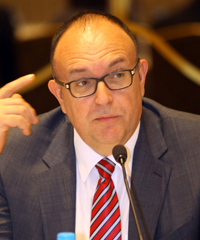 Murat LeCompte discussed several practical developments of the Southern Gas Corridor from the perspective of BP. Murat LeCompte discussed several practical developments of the Southern Gas Corridor from the perspective of BP.
LeCompte emphasized that the project has moved from “sheets of paper to sheets of steel,” which is a testament to the progress that has been made since the investment decision for the Shah Deniz II project was finalized.
He highlighted other key developments: additional wells have been drilled in the Caspian in the Shah Deniz II field (6 wells in total by the end of the year), a total of 9 billion dollars’ worth of contracts have been signed for the BP operated part of the pipeline, major engineering contracts have been signed, and construction activities have begun in Georgia.
Drawing on Ambassador Bryza’s remarks about the amount of gas that is currently being received by Europe, LeCompte added that there has been a sharp decline in Europe’s indigenous gas production. He said that according to BP estimates, “by 2035, Europe will need to import more than half of its gas requirements, which are steadily growing.”
On a final note, LeCompte emphasized that the Southern Gas Corridor was designed to be expandable in order to respond to the rising energy demands of Europe and to accommodate prospective supplies from as of yet undeveloped fields, such as Shah Deniz Deep and ACG Deep.
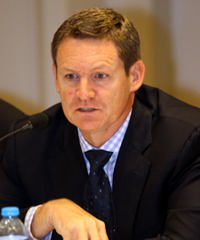 Michael Hoffmann began his talk by briefly introducing the Trans Adriatic Pipeline (TAP) and explaining the recent changes in the project’s shareholding. Tracing the development of the Southern Gas Corridor since its 2002 origins to 2019, when the first gas is likely to reach Europe, Hoffmann reiterated that it has been a “long, hard, and exciting journey.” Michael Hoffmann began his talk by briefly introducing the Trans Adriatic Pipeline (TAP) and explaining the recent changes in the project’s shareholding. Tracing the development of the Southern Gas Corridor since its 2002 origins to 2019, when the first gas is likely to reach Europe, Hoffmann reiterated that it has been a “long, hard, and exciting journey.”
While acknowledging the importance of geopolitics for a pipeline project that is 3,500 kms long and involving seven countries along its value chain, Hoffmann emphasized that, “Politics alone does not necessarily build pipelines. You need good prices, volume, reliable supplier and technical competence.”
Looking at the countries that the TAP is going to supply – including Greece, Bulgaria, and Italy – Hoffmann stated that TAP, as part of the Southern Gas Corridor, is going to make “a significant difference to the security of supply for these countries.” Hoffmann explained that the 1 bcma of gas that will reach each of the markets in Greece and Bulgaria represents approximately one-third of their current natural gas demand.
The necessity to diversify Europe’s energy sources further remains a critical objective, Hoffmann underlined. He also explicitly stated that from the TAP’s perspective, the Southern Gas Corridor is not in competition with other pipeline projects in the region.
 John Roberts began his remarks by taking up the question posed by the title of the event: Will all pipelines lead to Turkey? He then went on to discuss the potential resources that could join the Southern Gas Corridor via Turkey. “It would be fantastic if new Eastern Mediterranean gas could come to Turkey,” yet, Roberts explained that the Cyprus problem and the new Israeli-Egyptian agreement in August make it a low possibility. John Roberts began his remarks by taking up the question posed by the title of the event: Will all pipelines lead to Turkey? He then went on to discuss the potential resources that could join the Southern Gas Corridor via Turkey. “It would be fantastic if new Eastern Mediterranean gas could come to Turkey,” yet, Roberts explained that the Cyprus problem and the new Israeli-Egyptian agreement in August make it a low possibility.
Regarding Iraqi gas, he explained that it has the potential to provide 8-10 bcm by 2020, however the KRG is currently in “acute financial straits,” so we should expect its development to be slow. Roberts also pointed out that the situation in Kobani has thrown everything into question, including what the relationship will be between the Turkish government, the KRG, Turkey’s Kurdish population, and the Syrian Kurds.
Continuing to judge the likelihood of other potential suppliers joining the SCG, Roberts declared that Iran is a very interesting prospect, since current work on the giant South Pars field could, in the view of at least one major analyst, Bijan Khahejpour, be in a position to ensure a substantial surplus of gas production over domestic consumption within 18 months or so. However, he explained that in terms of transforming any surplus into actual exports everything depends on working out the nuclear agreement. He added that even if the negotiations are successful, the requirement for new or expanded infrastructure would limit the amount of additional gas Iran could deliver to Turkey in the near future, with major volumes still being deferred to the 2020s.
Citing Petronas’ recent purchase of Statoil’s 15.5 percent stake in Azerbaijan’s Shah Deniz production sharing agreement, Roberts commented that this could be a sign of increased likelihood of Turkmen gas joining the Southern Gas Corridor. Petronas, he noted, would be in a position to export some 5-10 bcm of gas westwards from its own Block One concession off Turkmenistan’s Caspian coast within a short time, if a trans-Caspian gas pipeline were to be available to carry it 300 kilometres to the current entry point of the Southern Gas Corridor at Sangachal, near Baku. Pointing to the fact that Gazprom had just declared it wanted to end its annual purchase of 10-11 bcm of natural gas from Turkmenistan, Roberts claimed that the prospective loss of sales to Russia had previously been the biggest commercial obstacle stopping Turkmenistan from transporting its gas westwards. An additional reason Turkmenistan is likely more interested in exporting to Europe is the concern that China will otherwise end up being its only export market. Roberts said that within the last several weeks President Berdimuhamedow has talked to representatives from Petronas about the possibility of exploring options to the West.
Roberts concluded his remarks by claiming that Azerbaijan is ultimately the source most likely to be able to guarantee delivery of additional supplies of gas (beyond current agreements concerning 16 bcm/y from the Second Phase of Shah Deniz). But he had a major caveat: the timeframe is not right for any immediate further addition to Azerbaijani supplies to or through Turkey. This, too, would have to wait for the 2020s. He also stated that the timing and the price are the two most important factors in the realization of these projects, adding the point, “new natural gas from any source will have to think about matching the price of American LNG if it wants to enter European markets.”
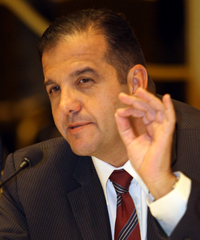 George Stavri contributed to the panel as a Discussant and elaborated on the Cyprus angle of Eastern Mediterranean natural gas politics. Ultimately, Stavri argued, “it is highly unlikely that Cyprus will be a real energy player in the region in the next 5 to 10 years.” Stavri explained that, in theory, natural gas reserves would work in Cyprus’ best interests, yet undertaking the project of developing its own resources is overwhelming for the Republic of Cyprus Stavri explained that Israel became the natural ally of the Greek administration, however, as Israel has a “bigger agenda to consider” the Greek administration is not equipped to manage this alliance. He also claimed that the resolution of the Cyprus problem is a prerequisite for Cyprus to become a viable energy player. Stavri mentioned that Cypriot reserves could go to Ceyhan, however, due to political reasons and especially the fear that Turkey could use this situation as leverage against the Republic of Cyprus this is currently impossible. George Stavri contributed to the panel as a Discussant and elaborated on the Cyprus angle of Eastern Mediterranean natural gas politics. Ultimately, Stavri argued, “it is highly unlikely that Cyprus will be a real energy player in the region in the next 5 to 10 years.” Stavri explained that, in theory, natural gas reserves would work in Cyprus’ best interests, yet undertaking the project of developing its own resources is overwhelming for the Republic of Cyprus Stavri explained that Israel became the natural ally of the Greek administration, however, as Israel has a “bigger agenda to consider” the Greek administration is not equipped to manage this alliance. He also claimed that the resolution of the Cyprus problem is a prerequisite for Cyprus to become a viable energy player. Stavri mentioned that Cypriot reserves could go to Ceyhan, however, due to political reasons and especially the fear that Turkey could use this situation as leverage against the Republic of Cyprus this is currently impossible.
According to Stavri, the LNG option is more desirable but Cyprus does not have the financial resources to build its own liquefaction plants. He claimed that the management of energy deposits in Cyprus could be a joint, bi-communal arrangement but in order to do this, an “honest powerbroker” would be required, which is lacking at this point. Stavri explained that an “honest powerbroker” would be the one to sanction a comprehensive, viable and just solution that would then allow the resultant Federal State to manage the natural wealth of the Cypriot citizens under the scrutiny of relevant laws thus, securing all citizens' interests in an equitable manner.
 
For the photo album of the event please click here
|










